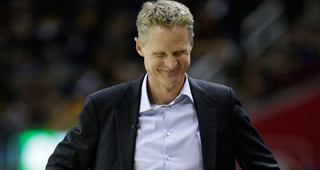The following is an excerpt from Danny Leroux's book “100 Things Warriors Fans Should Know & Do Before They Die”, which details the franchise's 55 years in the Bay Area and is on sale now ($15, Triumph Books)
Chapter 3 - 2015 Championship
The Warriors knew the 2014–15 season would involve massive changes after firing head coach Mark Jackson two days after losing to the Clippers in the first round of the 2014 playoffs. A little over a week later, they replaced Jackson with former player, general manager, and broadcaster Steve Kerr, who, like Jackson, had never coached at any level. While Kerr compiled a staff that included Alvin Gentry and Ron Adams, general manager Bob Myers added pieces to the two-time playoff squad, including signing guards Shaun Livingston and Leandro Barbosa to back up Stephen Curry and Klay Thompson.
Returning talent faced adjustments as well. Before the season, Kerr asked lifelong starter and 2013 signee Andre Iguodala to come off the bench in favor of third-year forward Harrison Barnes. The veteran appreciated Kerr’s candor and directness when making the tough ask and changed roles, which again strengthened the bench. Shortly thereafter, necessity became the mother of invention as David Lee suffered a strained hamstring in the team’s final preseason game and Kerr decided to start Draymond Green in his place. The new starting five of Curry, Thompson, Barnes, Green, and Bogut had played 51 minutes together the season before.
During training camp, Kerr told his new team, “We have the pieces here for a championship. Now I’m not going to talk about that again.”
Even with the significant turnover, the Warriors started out the season strong by winning their first five games and 21 of their first 23. Curry transformed from fascination to star in the new coaching staff’s more sophisticated offensive scheme and fueled Golden State’s jump from 12th to second in offense on his way to earning the league’s Most Valuable Player Award. The Warriors were also able to maintain the successful defense from Jackson’s tenure and that potent combination produced a 67-15 record that led the league by seven games.
Even with that success, there were plenty of reasons to question whether Golden State would be able to win the title. After all, those Warriors had never made it past the second round while San Antonio was a reigning champion who retained their key contributors and LeBron James had taken his talents back to his hometown Cleveland Cavaliers, who finished second in the East despite adding new pieces throughout the season. On top of those two, the Clippers and Rockets had put together strong seasons and looked dangerous at full strength.
On the last day of the regular season, the New Orleans Pelicans jumped into the No. 8 seed by shockingly beating the Spurs, who fell all the way from second to sixth. While the Pelicans staged a late comeback in Game 1, the Warriors won both contests at Oracle without too much incident. New Orleans took a huge 20-point lead into the fourth quarter in their first home playoff game since 2011, but the Warriors battled all the way back and Curry made a three-pointer deep in the corner to complete the comeback, sending the game to overtime, where Golden State closed it out before finishing off the sweep two days later.
From there, they had to face Memphis, a battle-tested opponent with quality size in Marc Gasol and Zach Randolph. The Warriors won Game 1 behind a strong defensive effort, but the Grizzlies took Game 2 in Oracle after receiving an emotional lift from returning point guard Mike Conley and then won Game 3 at home, putting Golden State in a 2–1 hole with another game in Memphis. That night, Green, Curry, Lee, and Festus Ezeli went to dinner at the Blues City Cafe to collect themselves and the coaching staff adjusted by putting center Andrew Bogut on noted non-shooter Tony Allen, allowing the big man to help all over the floor. The Warriors won each of the remaining three games by double digits.
On the other side of the bracket, the Clippers knocked out the Spurs in a seven-game classic before falling to the second-seeded Rockets. In Game 1 of the Western Conference Finals, the Rockets took a 16-point lead in the first half but the Warriors again came all the way back and won behind 34 points from Curry and a complete game from Green, who came two assists short of a triple-double. Golden State took that momentum and won Game 2 despite MVP runner-up James Harden fueling a Houston comeback with a near triple-double of his own. Unlike their prior two series, the Warriors started strong in their first road game, controlling the whole way as Curry scored 40 points in a 115–80 win. The drama in the series came when Curry had a bad fall in Game 4 and needed to pass the concussion protocol before rejoining the game. Harden’s 17 points in the fourth quarter helped secure a Rockets victory but Golden State closed out the series in Game 5 with a stressful 104–90 win.
Returning to their first NBA Finals in 40 years, the Warriors had to defeat LeBron James’ Cleveland Cavaliers. Game 1 was an absolute battle and Iman Shumpert missed a potential gamewinning shot at the end of regulation. Cleveland point guard Kyrie Irving had played one of the best defensive games of his career but fractured his kneecap in overtime and missed the remainder of the Finals. Even without him, Cleveland won Game 2 in overtime as James dominated with a triple-double that was just enough to overcome a late Warriors rally. As was the case against Memphis, the Warriors also fell in Game 3, putting them in a familiar 2–1 hole.
This time, the coaching staff’s adjustment was even more significant: moving Andre Iguodala into the starting lineup in place of Andrew Bogut and shifting Green to starting center. Alignments with Green at center had fared well at moments in the first three rounds of the playoffs but that five-man lineup had only played a total of 62 playoff minutes together to that point. Coach Kerr credited the change to special assistant Nick U’Ren, who pointed to a similar adjustment the Spurs had made against James’ Heat team in the middle of their NBA Finals the previous season. Beyond playing their best defense of the series—including Iguodala spending more time guarding James—the man who gave up his starting spot played a major offensive role as well, chipping in 22 points and actually outscoring James by two. With newfound confidence, the Warriors returned home and Curry produced his best performance of the Finals, with 37 points and a definitive highlight when he crossed over Matthew Dellavedova and nailed a three-pointer.
One win away from an NBA championship, the Warriors had to return to Cleveland for Game 6. The Cavaliers fought their way back from a first-quarter deficit to only trail by two at halftime but Golden State closed it out with a strong third quarter that provided the margin they carried through the fourth and to their first championship in 40 years. Both Curry and Iguodala scored 25 points and the sixth-man-turned-starter won Finals MVP due to his defense on James and scoring punch those final three games. The championship cemented Curry’s place as a superstar and also made history as the first time a team won a title with a first-year coach since Pat Riley and the Lakers in 1982. Guard Leandro Barbosa, who ended a March 21 postgame interview with sideline reporter Rosalyn Gold-Onwude with, “We gonna be championship,” reveled in the moment and changed the tense of his famous proclamation to “We are championship.”
Two days later, the Warriors held their championship parade and approximately 1 million people filled the streets of Oakland to celebrate a remarkable season in a moment of true catharsis for a long-tortured fan base. In three years, the franchise had finally and improbably completed the journey from black sheep to gold standard.



